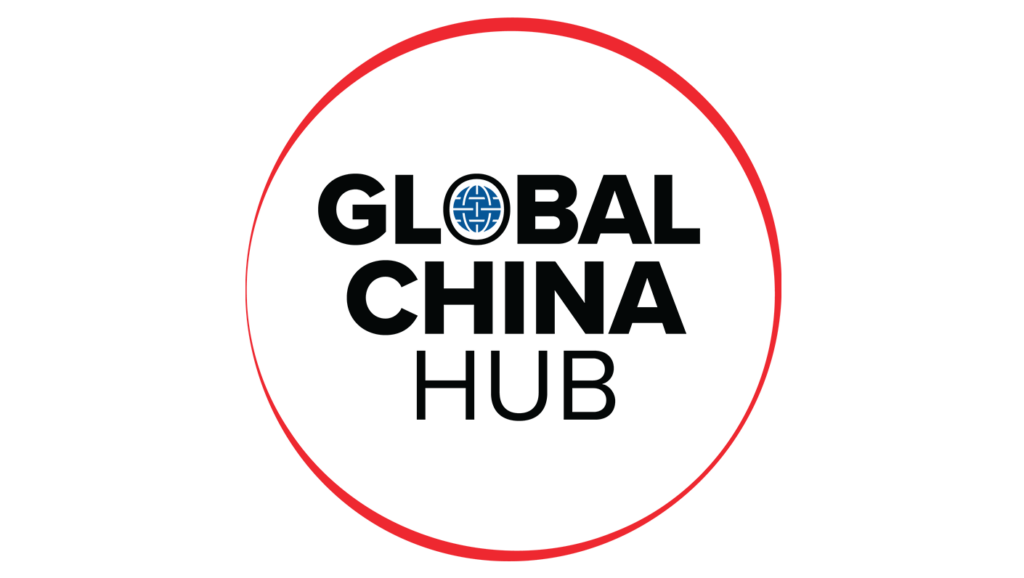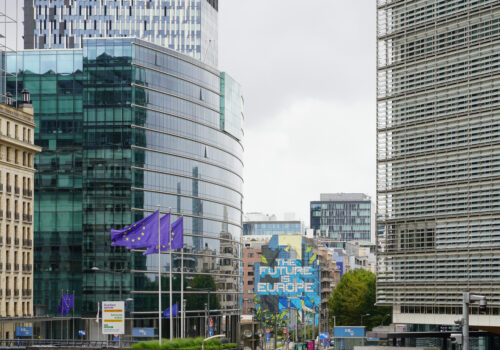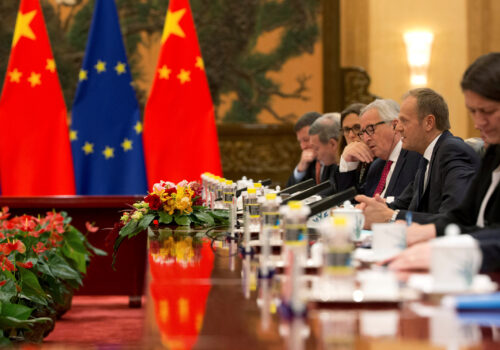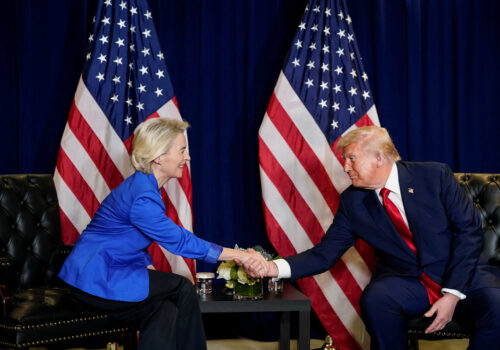Greece’s policy on China: Debt-era deals and recalibration
This is the eleventh chapter of the report “Is Europe waking up to the China challenge? How geopolitics are reshaping EU and transatlantic strategy.” Read the full report here.
Over the last two decades, Greece’s policy toward China has shifted from enthusiastic optimism to a more cautious approach—a shift that reflects broader transatlantic and European Union (EU) dynamics. The bilateral relationship deepened significantly during Greece’s sovereign debt crisis, when economic pressures reshaped Athens’ foreign and fiscal policy priorities. The privatization programs, mandated under Greece’s bailout agreements and driven by the International Monetary Fund (IMF), paved the way for major Chinese investments—most prominently the 2016 takeover of the port of Piraeus by state-owned China Ocean Shipping Company Limited (COSCO). This flagship project of China’s Belt and Road Initiative (BRI) secured Beijing a key gateway into Europe.
Athens formally joined the BRI in 2018 and the China-led “17+1” framework in 2019, signaling a pragmatic alignment with Beijing that at times tempered Greece’s support for EU criticism of China on issues such as human rights. Following the signing of major maritime port concessions and the sale of additional corporate assets to Chinese firms, however, concerns grew in Athens and Brussels over the national security ramifications of these acquisitions. These worries—combined with shifting geopolitical dynamics—prompted Greece to recalibrate its policy and move into closer alignment with its EU and NATO partners.
Trade and investment: From Thucydides to the port of Piraeus
Greece first established diplomatic ties with the People’s Republic of China in 1972, shortly after China’s entry into the United Nations. In the 1980s, Athens deepened its relations with Beijing both to secure political backing amid tensions with Turkey and to expand economic cooperation, particularly in shipbuilding. Sino-Greek trade was modest in the early 2000s, totaling about $900 million in 2001, but expanded significantly in the following decades, particularly after the global financial crisis, reaching nearly $8 billion by 2024. This growth, however, has been marked by a widening imbalance: Greek exports fell from more than $1 billion in 2018 to just $450 million in 2024, while imports from China almost doubled—from $4.2 billion to $7.5 billion—driving the trade deficit past $7 billion.1“Greece Exports to China,” Trading Economics, last visited October 9, 2025, https://tradingeconomics.com/greece/exports/china; “Greece Imports from China,” Trading Economics, last visited October 9, 2025, https://tradingeconomics.com/greece/imports/china.
Greek exports to China account for roughly 0.9 percent of Greece’s total $53 billion in exports in 2024, consisting mainly of minerals, agricultural products, and pharmaceuticals.2“Greece Exports by Country,” Trading Economics, last visited October 9, 2025, https://ar.tradingeconomics.com/greece/exports-by-country. Chinese imports are far more diverse, dominated by machinery, electronics, and other manufactured goods. China is now Greece’s second-largest import partner, representing 8.5 percent of the country’s $90 billion in total imports.
On investment, Greece has become a key entry point for Chinese capital into Europe. Between 2000 and 2024, cumulative Chinese foreign direct investment (FDI) in Greece totaled about $5 billion, according to the Mercator Institute for China Studies,3Agatha Kratz, et al., “Chinese Investment Rebounds Despite Growing Frictions—Chinese FDI in Europe: 2024 Update,” Mercator Institute for China Studies and Rhodium Group, May 21, 2025, https://merics.org/en/report/chinese-investment-rebounds-despite-growing-frictions-chinese-fdi-europe-2024-update. concentrated in infrastructure, energy, shipping, and telecommunications. Other estimates are considerably higher: the China Global Investment Tracker reports $9.7 billion in investment and construction contracts between 2005 and 2025, underscoring the scale of Beijing’s economic footprint in the country.4“China Global Investment Tracker,” American Enterprise Institute, last visited October 9, 2025, https://www.aei.org/china-global-investment-tracker/.
The port of Piraeus,5Today, the container terminal and shipbuilding zone are based in Perama, the car terminal in Keratsini-Drapetsona, and the passenger port remains in central Piraeus. COSCO’s flagship BRI project with investments exceeding $600 million, has become a centerpiece of Chinese engagement in Europe, a main gateway for Chinese goods, and a symbol of Sino-Greek cooperation.6“China, Greece Agree to Push Ahead with COSCO’s Piraeus Port Investment,” Reuters, November 11, 2019, https://www.reuters.com/article/business/china-greece-agree-to-push-ahead-with-coscos-piraeus-port-investment-idUSKBN1XL1LC/. This investment reflects both Greece’s economic vulnerabilities and China’s maritime ambitions under the BRI.
Piraeus has been strategically important since antiquity. Modernized in 1930 with the founding of the Piraeus Port Authority as a state-owned company and expanded in the 1970s, it has remained central to Greece’s maritime role. China’s involvement began in 2008, when COSCO secured a thirty-five-year contract to operate two piers, despite labor strikes and public opposition. Following Greece’s debt crisis, as the country implemented privatizations mandated under its bailout agreements, COSCO acquired 51 percent of the Piraeus Port Authority for $310 million, making the port the “dragon head” of China’s presence in Greece. COSCO expanded its stake to 67 percent in 2021 with an additional $95 million investment.7The rest of the shares are held by the Hellenic Asset Development Fund (7 percent) and non-institutional investors (26 percent). “Investors Information,” Piraeus Port Authority, last visited October 9, 2025, https://www.olp.gr/en/investor-relations/investors-information. With shipping times of about twenty-two days from Shanghai—roughly ten days shorter than routes to Rotterdam or Hamburg—Piraeus has become a strategic BRI hub. Its role is reinforced by Greece’s global shipping dominance: the Greek merchant fleet, the largest in the world, controls 21 percent of global and 60 percent of EU capacity, with nearly five thousand vessels valued at $70 billion. Greek shippers transport an estimated 60 percent of China’s exports.
COSCO’s investment has brought substantial gains. Container traffic rose from 1.5 million twenty-foot equivalent units in 2009 to 6.2 million in 2025, making Piraeus the largest container hub in the Mediterranean.8“Piraeus Port Authority: Annual Financial Highlights 2024,” Athens Exchange Group, May 2025. Revenues grew from a $37 million loss in 2009 to more than $250 million in 2024, alongside job creation and local development.9Tasos Kokkinidis, “Greece’s Piraeus Port Achieves Record Revenues and Profits in 2024,” Greek Reporter, April 2, 2025, https://greekreporter.com/2025/04/02/greece-piraeus-port-record-revenues-profits-2024/. Yet COSCO’s ambitions have also met resistance. In 2022, Greece’s Supreme Administrative Court blocked a planned $4.5 billion passenger port project for failing environmental review, highlighting tensions between large-scale foreign investment, domestic regulation, and security concerns.10Eleni Stamatoukou, “Greece: Administrative Court Blocks Expansion of China Backed Piraeus Port due to Lack of Environmental Assessment,” Business and Human Rights Resource Centre, March 15, 2022, https://www.business-humanrights.org/en/latest-news/greece-administrative-court-blocks-expansion-of-china-backed-piraeus-port-due-to-lack-of-environmental-assessment/. This shift reflects Athens’ adoption of a more cautious approach toward Beijing in recent years and its alignment with US and EU efforts to screen Chinese strategic investment. In May 2025, the Greek government enacted its first structured FDI screening law (Law 5202/2025),11The FDI screening regime covers greenfield projects and acquisitions in sectors such as energy, healthcare, transport, telecommunications, and digital infrastructure, with stricter thresholds for defense, AI, cybersecurity, ports, underwater facilities, and border-area tourism. modeled on Germany’s screening system and fully aligned with the corresponding EU regulation 2019/452.12Nicolas Tselikas Bouzeau, et al., “From Open Door to Watchful Gatekeeper: Greece Adopts a Foreign-Investment Screening Mechanism,” A&O Sherman, June 2, 2025, https://www.aoshearman.com/en/insights/from-open-door-to-watchful-gatekeeper-greece-adopts-a-foreign-investment-screening-mechanism.
The BRI and the “17+1” format
Greece’s engagement with China deepened significantly in 2016, following Prime Minister Alexis Tsipras’ visit to Beijing. In the wake of his meeting with President Xi Jinping, Greece grew increasingly close to the BRI and the “16+1” cooperation format, a platform through which China engaged sixteen central and eastern European countries. Athens had already gained observer status in the “16+1” at the Riga Summit, alongside the EU, the European Bank for Reconstruction and Development, Austria, and Switzerland. In May 2017, Tsipras attended the inaugural Belt and Road Forum, signaling Athens’ ambitions to serve as a bridge between Europe and Asia.13Philippe Le Corre, “A Divided Europe’s China Challenge,” Carnegie Endowment for International Peace, November 26, 2019, https://carnegieendowment.org/posts/2019/11/a-divided-europes-china-challenge?lang=en. Two years later, in April 2019, Greece joined the initiative—by then rebranded as the “17+1”—at the Dubrovnik Summit.14“Greece Joins 16+1 Initiative for Regional Trade with China,” Ekathimerini, April 12, 2019, 2025, https://www.ekathimerini.com/news/239523/greece-joins-16-1-initiative-for-regional-trade-with-china/.
With regard to the BRI, Greece had already signed a memorandum of understanding in August 2018 during Foreign Minister Nikos Kotzias’s visit to Beijing, becoming the first developed European country to formally join. Athens stressed that cooperation would proceed “in full respect of EU rules and procedures,” framing the agreement as an instrument for growth rather than divergence.15“Greece Joins China’s Belt and Road Initiative,” Ekathimerini, August 27, 2018, https://www.ekathimerini.com/economy/231908/greece-joins-china-s-belt-and-road-initiative/. Italy and Luxembourg later followed with similar accords. High-level exchanges intensified in 2019. Tsipras visited Beijing again; President Prokopis Pavlopoulos attended the Conference on Dialogue of Asian Civilizations; and, in November, President Xi paid a state visit to Athens, marking the symbolic consolidation of Sino-Greek relations within the BRI framework.
Technology: Critical networks, critical choices
Over the past two decades, Chinese telecom giant Huawei has established a strong foothold in Greece’s telecommunications sector, supplying more than half of the country’s highly sensitive 4G radio access networks (RANs).16Eliza Gkritsi, “How Huawei Hooked Greek Telcos,” TechNode, December 9, 2020, https://technode.com/2020/12/09/how-huawei-hooked-greek-telcos/?. This mirrors a broader European pattern, with Chinese vendors supplying over 50 percent of 4G RAN equipment in fifteen out of thirty-one countries.17“Understanding the Market for 4G RAN in Europe: Share of Chinese and Non-Chinese Vendors in 102 Mobile Networks,” Strand Consult, last visited October 9, 2025, https://www.strandconsult.dk/understanding-the-market-for-4g-ran-in-europe-share-of-chinese-and-non-chinese-vendors-in-102-mobile-networks. Huawei’s rise in Greece was closely tied to the 2008 global financial crisis, when its cost-competitive solutions enabled operators such as Wind Hellas to expand their network capacity. It later participated in early 5G pilot projects in Athens, Trikala, and Kalamata, though the Kalamata project—in partnership with Vodafone and Luxoft—was suspended after local opposition.18“Kalamata Greece Suspends 5G Program,” Environmental Health Trust, December 3, 2019, https://ehtrust.org/kalamata-greece-suspends-5g-program/. Although Huawei’s consumer market share later plummeted—from 25 percent in 2017 to just 2.5 percent by 2025—due to sanctions, supply-chain disruptions, and shifting consumer preferences, it remains strategically embedded in Greece’s network infrastructure.19“Company Officials: Huawei Tops Smartphone Sales in Greece,” Tornos News, February 8, 2018, https://www.tornosnews.gr/en/tourism-businesses/new-investments/29959-company-officials-huawei-tops-smartphone-sales-in-greece.html.
Still, China’s broader tech footprint in Greece is relatively limited. This is partly because Greek regulators—in line with EU policy—have grown more cautious about Beijing’s involvement in critical technology infrastructure. While the Hellenic Police purchased twelve Chinese-made drones for border surveillance in 2020, subsequent tech cooperation has slowed.20Dimitrios Stroikos, “Head of the Dragon or Trojan Horse? Reassessing China—Greece Relations,” Journal of Contemporary China 32, 142 (2022), https://eprints.lse.ac.uk/114929/3/Head_of_the_Dragon_or_Trojan_Horse_Reassessing_.pdf. In February 2025, the Hellenic Data Protection Authority launched an investigation into the Chinese chatbot DeepSeek over potential privacy violations, reflecting broader European concerns about digital sovereignty.21Mary Drosopoulos, “Greece: DeepSeek and Technological Sovereignty,” Osservatorio Balcani e Caucaso Transeuropa, May 7, 2025, https://www.balcanicaucaso.org/eng/Areas/Greece/Greece-DeepSeek-and-Technological-Sovereignty-237607.
Although Athens initially hesitated to join the first Trump administration’s Clean Network Initiative—a US-led effort to exclude Chinese technology from 5G and other critical digital infrastructure—Greece formally became a member in June 2020, demonstrating a careful balance between economic pragmatism and geopolitical considerations.22“Building a Clean Network: Key Milestones,” US Department of State, last visited October 9, 2025, https://2017-2021.state.gov/building-a-clean-network-key-milestones/. Cosmote, Greece’s largest mobile operator, opted for Ericsson over Huawei for its 5G rollout, and Chinese state-owned enterprises (SOEs) have since been excluded from public tenders—even as Huawei equipment continues to operate in parts of existing 4G networks.
Amid this shifting landscape, Huawei has sought to diversify its footprint in Greece. In partnership with the Greek energy company Faria Renewables, it is developing up to 1 GWh of battery storage, beginning with a 49.9 MW/134 MWh project awarded in the country’s second battery auction. The $30 million investment—financed by Attica Bank and backed by the EU’s “Greece 2.0” recovery plan—illustrates Huawei’s effort to align with EU-funded energy priorities while maintaining a presence in Greece’s green transition.23Greece 2.0 is the Greek government’s national program implemented within the framework of the EU’s Recovery and Resilience Facility (RRF), the main pillar of the NextGeneration EU initiative. It allocates more than €30 billion in grants and loans to support projects advancing digital transformation, the green transition, infrastructure upgrades, and innovation. “Faria Renewables, Huawei Setting Up Battery Partnership in Greece,” Balkan Green Energy News, January 24, 2025, https://balkangreenenergynews.com/faria-renewables-huawei-setting-up-battery-partnership-in-greece. In early 2025, the company also announced a logistics hub at the port of Piraeus, underscoring ambitions to expand supply-chain and digital infrastructure links across the Mediterranean.24David Glass, “Huawei Eyes Logistics Hub in Piraeus,” Seatrade Maritime News, January 2, 2025, https://www.seatrade-maritime.com/ports-logistics/huawei-eyes-logistics-hub-in-piraeus.
Security: Navigating China’s mediterranean ambitions
Sino-Greek relations have taken on strategic weight due to Chinese investment in critical infrastructure, most notably in the port of Piraeus. While COSCO’s stake supported Greece’s post-crisis recovery, it also triggered concerns in Washington and Brussels over strategic dependence and NATO security. Chinese control of a major European port is widely viewed as a risk to supply-chain resilience and allied naval operations. Tensions escalated in January 2025 when the US Department of Defense listed COSCO among firms allegedly linked to China’s military. The listing carried no direct sanctions but fueled fears of “self-sanctioning” by companies and added uncertainty amid global shipping disruptions.25Jonathan Saul, Yannis Souliotis, and Renee Maltezou, “Greece Examines Impact of US Blacklisting of Piraeus Port Owner COSCO—Sources,” Reuters, January 10, 2025, https://www.reuters.com/world/greece-examines-impact-us-blacklisting-piraeus-port-owner-cosco-sources-2025-01-10/.
From a transatlantic perspective, Piraeus has become emblematic of the risks of strategic dependency, shaping EU de-risking policies, NATO security debates, and broader great-power competition. US officials have warned that Chinese control of critical infrastructure in a NATO member state could weaken alliance resilience.26“U.S. Expresses Concerns over Chinese Investments in Piraeus,” Ekathimerini, October 9, 2019, https://www.ekathimerini.com/economy/245818/us-expresses-concerns-over-chinese-investments-in-piraeus. Allies likewise fear Beijing might leverage Piraeus in ways that complicate allied naval operations and long-term strategic planning. These concerns are amplified by NATO’s reliance on Greek ports such as Souda Bay in Crete, a key base for US and allied naval forces.
To counterbalance Chinese influence, Washington and Brussels have backed the Alexandroupolis LNG terminal27The Alexandroupolis LNG terminal is a floating storage and regasification unit (FSRU) located offshore southwest of Alexandroupolis, Greece.—a $380 million project launched in May 2022, largely financed by the EU—as both a strategic and political investment. Linked to regional pipelines, the terminal is designed to strengthen Europe’s energy resilience and anchor NATO’s presence in Southeastern Europe.28Terysa King, “Port of Alexandroupolis Makes Sustainment History with Heavy Brigade Movement,” US Army, March 17, 2024, https://www.army.mil/article/274572/port_of_alexandroupolis_makes_sustainment_history_with_heavy_brigade_movement. Its dual role in energy and defense makes it a linchpin of US-Greek cooperation and a counterweight to Chinese leverage at Piraeus.
Athens, for its part, has sought to balance openness to Chinese capital with its commitments to the EU and NATO. It aligns with EU positions on cybersecurity, maritime law, and human rights, while steering clear of security cooperation with China that might unsettle NATO—limiting engagement to symbolic gestures such as port visits and participation in multilateral exercises. Under Prime Minister Kyriakos Mitsotakis, Greece has deepened ties with the United States and the EU, limiting Huawei’s role while maintaining pragmatic economic cooperation and high-level exchanges with Beijing.
Beyond the strategic and economic realm, China has also expanded its soft-power presence in Greece through education and research cooperation. Academic ties have grown since the opening of Greece’s first Confucius Institute in 2009. The 2008 global financial crisis accelerated cooperation, and today five universities host Confucius Institutes alongside joint degree programs, teaching centers, and EU-funded research projects.29“Greece: The Overlooked Risks of Academic Cooperation with China,” Center for European, International and Security Studies, June 24, 2025, https://ceias.eu/greece-the-overlooked-risks-of-academic-cooperation-with-china. Twenty-seven Greek institutions maintain over 135 partnerships with Chinese counterparts.“30China–Europe Academic Engagement Tracker: Greece,” Center for European, International and Security Studies, last visited October 9, 2025, https://academytracker.ceias.eu/map/eu/Greece. Yet, the absence of a coherent research policy and limited transparency have fueled concerns over collaboration with authoritarian states in sensitive fields.
Greece’s alignment with the EU’s China policy
Over the past two decades, Greece has evolved from a frequent outlier in EU China policy to a cautious participant in Brussels’ de-risking agenda. Historically, Athens occasionally departed from the EU line on foreign policy—blocking, for instance, a 2016 statement on the Permanent Court of Arbitration’s ruling against Beijing’s maritime claims in the South China Sea.31Robin Emmott, “EU’s Statement on South China Sea Reflects Divisions,” Reuters, July 15, 2016, https://www.reuters.com/article/us-southchinasea-ruling-eu-idUSKCN0ZV1TS/. Likewise, Greece vetoed a 2017 EU statement at the United Nations Human Rights Council condemning human rights abuses in China,32Nektaria Stamouli, “Greece Vetoes EU Condemnation of China’s Human-Rights Record,” Wall Street Journal, June 19, 2017, https://www.wsj.com/articles/greece-vetoes-eu-condemnation-of-china-human-rights-record-1497858040. marking the first time such a joint resolution failed to pass. These moves reflected Athens’ close ties with Beijing, strengthened further when Greece joined the Asian Infrastructure Investment Bank and the “17+1” format and hosted President Xi Jinping for a state visit in 2019.33Helena Smith, “Xi Jinping Comes to Greeks Bearing Gifts,” Guardian, November 12, 2019, https://www.theguardian.com/world/2019/nov/12/xi-jinping-comes-to-greeks-bearings-gifts.
Since 2020, however, Athens has adjusted course. A shifting geopolitical environment—including Turkey’s assertiveness in the Eastern Mediterranean, intensifying Sino-US rivalry, and deteriorating EU-China relations—has reinforced Greece’s dependence on US and NATO security guarantees.34Stroikos, “Head of the Dragon or Trojan Horse? Reassessing China—Greece Relations,” 602–619. While Piraeus remains the flagship BRI project, Chinese investment has waned35“Foreign Direct Investment (FDI) Inflows in Greece by Country of Origin,” Statista, last visited October 9, 2025, https://www.statista.com/statistics/1613585/fdi-inflows-in-greece-by-origin. as Greece’s economy has recovered and diversified its sources of foreign capital, with annual FDI inflows rising from $330 million in 2010 to $7.3 billion in 2024.36“Foreign Direct Investment: Inward and Outward Flows and Stock (Annual Data),” United Nations Conference on Trade and Development, last updated September 1, 2025, https://unctadstat.unctad.org/datacentre/dataviewer/US.FdiFlowsStock. Even in Piraeus, COSCO’s efforts to expand operations have met both bureaucratic37Tasos Kokkinidis, “Greek Archaeological Council Derails COSCO’s Investment Plan for Piraeus,” Greek Reporter, April 3, 2019, https://greekreporter.com/2019/04/03/greek-archaeological-council-derails-coscos-investment-plan-for-piraeus/. and local resistance.38Momoko Kidera, “‘Sold to China’: Greece’s Piraeus Port Town Cools on Belt and Road,” Nikkei Asia, December 9, 2021, https://asia.nikkei.com/Spotlight/Belt-and-Road/Sold-to-China-Greece-s-Piraeus-port-town-cools-on-Belt-and-Road.
Reflecting this recalibration, Greece declined to host the “17+1” summit in 2022 and has avoided positions that break EU consensus. Chinese SOEs have been increasingly sidelined in public tenders, and in 2020 Greece’s largest telecom operator chose Ericsson over Huawei for developing its 5G network. Under EU and US pressure, Greece also adopted a robust FDI screening mechanism and aligned with the EU’s derisking agenda. Its earlier reluctance stemmed from debt-crisis dependency on foreign capital, a political focus on recovery over security, and limited institutional capacity.39Dimitrios Stroikos, “China–Greece Relations at 50: A Not So Happy Anniversary?” China Observers in Europe, September 20, 2022, https://chinaobservers.eu/china-greece-relations-at-50-a-not-so-happy-anniversary. In October 2024, Greece’s abstention on EU tariffs against Chinese electric vehicles underscored its new pragmatic balancing act—supporting EU de-risking while preserving economic ties with Beijing.40“How EU Governments Voted on Chinese EV Tariffs,” Reuters, October 4, 2024, https://www.reuters.com/business/autos-transportation/how-eu-governments-plan-vote-chinese-ev-tariffs-2024-10-04/?utm.
Conclusion
Greece has adopted a measured and pragmatic stance toward China. It accepts the EU’s designation of China as a “systemic rival” but avoids direct confrontation, seeking to balance transatlantic commitments with the economic benefits of engaging Beijing. This balancing act is most visible at the port of Piraeus, where COSCO’s investment has become both a symbol of China’s presence in Greece and a pillar of Beijing’s economic diplomacy.
Within the US-China strategic rivalry, Greece remains firmly anchored in NATO and aligned with the United States on security, yet it does not treat China as an adversary. Athens emphasizes the importance of a strong US presence in the Mediterranean but avoids alienating Beijing to protect key national interests such as shipping, tourism, and foreign investment. It maintains a careful posture—committed to transatlantic security but cautious in managing economic ties with China.
On Russia’s war in Ukraine and Beijing’s alignment with Moscow, Athens has voiced criticism but refrained from the sharper rhetoric of Northern European states. It complies with EU export controls and recognizes the risks of dual-use technologies, though enforcement remains looser than in Baltic states. On economic competitiveness, Greece recognizes the risks of Chinese overcapacity and participates in EU debates on de-risking and FDI screening, but does so pragmatically. It continues to welcome Chinese investment in infrastructure, energy, and logistics while adapting cautiously to EU digital sovereignty initiatives. For Athens, resilience is understood more in economic than military terms—and it interprets the EU’s de-risking approach not as a rigid doctrine but as a flexible framework.
Greece thus walks a middle path: anchored in NATO and EU solidarity, yet unwilling to forgo the economic advantages of engaging China. Its approach remains pragmatic, shaped by regional security priorities and an enduring commitment to economic stability.
About the author
Related Content
Explore the programs

The Global China Hub tracks Beijing’s actions and their global impacts, assessing China’s rise from multiple angles and identifying emerging China policy challenges. The Hub leverages its network of China experts around the world to generate actionable recommendations for policymakers in Washington and beyond.

The Europe Center promotes leadership, strategies, and analysis to ensure a strong, ambitious, and forward-looking transatlantic relationship.
Image: Chinese President Xi Jinping and Greek Prime Minister Kyriakos Mitsotakis visit the container terminal of China Ocean Shipping Company (COSCO), in Piraeus, Greece November 11, 2019. Orestis Panagiotou/Pool via REUTERS



